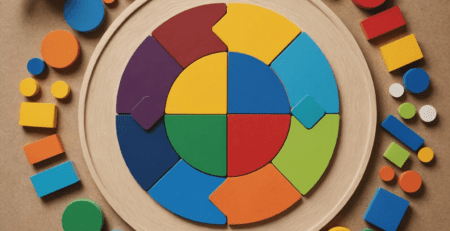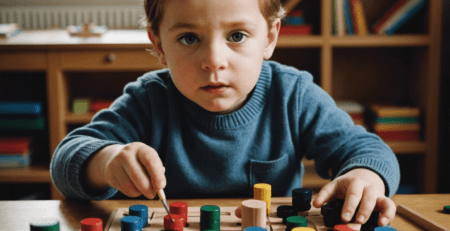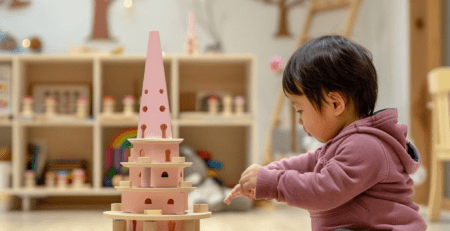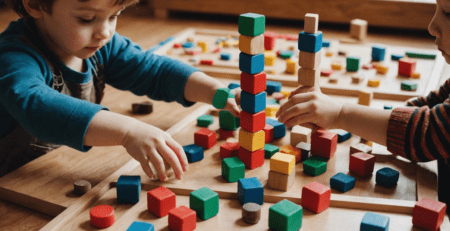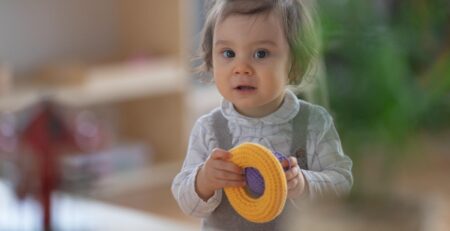
21
Exploring the Benefits of Montessori Education
Are you curious about the Montessori education method? With its emphasis on child-led learning and hands-on experiences, it has become a popular choice for many parents and educators. In this article, we will explore the question of whether Montessori is a good educational approach, examining both its strengths and potential considerations. So, sit back and join us on this journey of discovery as we delve into the world of Montessori education.
Table of Contents
- Is Montessori Education Effective?
- The Benefits of Montessori Education
- Montessori vs. Traditional Education: A Comparison
- Montessori Education: Is it Right for Your Child?
- Research on Montessori Education
- Common Misconceptions About Montessori
- Q&A
- Insights and Conclusions
Is Montessori Education Effective?
Montessori education is a unique and innovative approach to learning that has gained popularity in recent years. But is Montessori education really effective? The answer is a resounding yes. Montessori education has been proven to be highly effective in fostering independence, critical thinking, and a love for learning in children.
One of the key principles of Montessori education is allowing children to learn at their own pace and explore subjects that interest them. This approach not only promotes a deeper understanding of concepts but also encourages a love for learning that lasts a lifetime. Additionally, the focus on hands-on, experiential learning in Montessori schools helps children develop practical skills and problem-solving abilities that are essential for success in the real world.
In summary, Montessori education is indeed effective in nurturing well-rounded, independent, and intellectually curious individuals. It is a highly recommended educational approach for parents who want to provide their children with a solid foundation for future success.
The Benefits of Montessori Education
Montessori education has gained popularity in recent years for its unique approach to learning and child development. This educational method, developed by Dr. Maria Montessori in the early 20th century, emphasizes independence, freedom within limits, and a holistic approach to education. There are several benefits to Montessori education that make it a compelling choice for many parents and educators.
- Individualized Learning: In a Montessori classroom, children are encouraged to learn at their own pace, focusing on their individual strengths and interests. This personalized approach to learning allows for a deeper understanding of concepts and promotes a lifelong love of learning.
- Hands-On Learning: Montessori education emphasizes hands-on, experiential learning. Children are given the opportunity to explore, manipulate, and interact with materials, fostering a deeper understanding of concepts and promoting critical thinking skills.
- Emphasis on Social and Emotional Development: The Montessori method places a strong emphasis on the social and emotional development of children, nurturing their sense of self, empathy, and respect for others. This focus on the whole child helps to cultivate well-rounded individuals.
Overall, Montessori education offers a unique and effective approach to learning, catering to the individual needs of each child and promoting a lifelong love of learning.
| Benefits of Montessori Education | Description |
|---|---|
| Individualized Learning | This approach allows for a deeper understanding of concepts and promotes a lifelong love of learning. |
| Hands-On Learning | Fosters critical thinking skills and a deeper understanding of concepts. |
| Social and Emotional Development | Nurtures empathy, respect for others, and a sense of self. |

Montessori vs. Traditional Education: A Comparison
When it comes to choosing the best educational approach for your child, the debate between Montessori and traditional education has been ongoing for years. Both systems have their own unique features, and it’s essential to understand the differences before making a decision. Let’s take a closer look at the key aspects of Montessori and traditional education to help you make an informed choice for your child’s future.
The Montessori Approach
The Montessori method is child-centered and aims to foster independence and self-motivation. In a Montessori classroom, children have the freedom to choose their activities and work at their own pace. Teachers act as facilitators, guiding and supporting the child’s learning process. The classroom environment is designed to encourage exploration, creativity, and critical thinking. Montessori education emphasizes hands-on, experiential learning, and values the development of the whole child – including social, emotional, and cognitive skills.
Traditional Education
In traditional education, the focus is on structured learning, where students follow a predetermined curriculum and the teacher leads the class. There is less emphasis on individualized learning and more focus on standardized testing and grades. Traditional education places a higher value on academic achievements and prepares students for a more structured environment. While traditional education provides a solid foundation in core subjects, it may not always cater to the diverse needs and learning styles of all students.
Montessori Education: Is it Right for Your Child?
When it comes to choosing the best education for your child, there are various options available, and Montessori education is one of them. Montessori education is a holistic approach that focuses on the overall development of the child, including cognitive, social, emotional, and physical development. It emphasizes the child’s independence, freedom within limits, and respect for the child’s natural psychological, physical, and social development.
What sets Montessori education apart from traditional education?
- Child-centered learning: Montessori education allows children to learn at their own pace and encourages them to explore their interests.
- Hands-on learning: Children are provided with hands-on materials to explore and learn through self-discovery.
- Multi-age classrooms: Montessori classrooms often consist of children of different ages, allowing older children to mentor younger ones, promoting a sense of community and collaboration.
Overall, Montessori education can be a great option for children who thrive in an environment that promotes independence, creativity, and hands-on learning. However, it’s essential to consider your child’s unique needs and personality before making a decision.
Research on Montessori Education
Montessori education has been a subject of much debate and discussion in recent years. Advocates of the Montessori approach often praise its child-centered, hands-on learning methods, while critics argue that it may lack structure and academic rigor. But what does the research say about the effectiveness of Montessori education?
- Several studies have found that children who attend Montessori schools tend to develop strong social skills and a sense of independence.
- A 2006 study published in the journal “Science” reported that Montessori students performed better on standardized tests of academic achievement compared to their peers in traditional educational settings.
- Another study from the University of Virginia found that children who attended Montessori schools showed stronger executive function skills, such as self-regulation and cognitive flexibility.
While the is promising, it’s essential to consider that individual results may vary. Factors such as the quality of the Montessori program, the training and experience of the teachers, and the resources available to the school can all influence the effectiveness of the approach. As with any educational philosophy, it’s crucial to evaluate its suitability for your child based on their specific needs and learning style.

Common Misconceptions About Montessori
There are several misconceptions about Montessori education that often lead to confusion among parents and educators. One common misconception is that Montessori schools lack structure and discipline. In reality, Montessori education promotes self-discipline and independence through carefully designed environments and materials. Another misconception is that Montessori education is only for wealthy families. However, many public and private Montessori schools offer scholarships and financial aid to make education accessible to a diverse range of students.
Furthermore, some people believe that Montessori education only focuses on academic subjects and neglects social and emotional development. This is not true, as Montessori education emphasizes the importance of social interaction, conflict resolution, and emotional intelligence. It is essential to challenge these misconceptions about Montessori education to truly understand its value and benefits for children.
Q&A
Q: Is Montessori education effective for all children?
A: Montessori education has been found to be effective for many children, but individual results may vary.
Q: What are the benefits of a Montessori education?
A: Montessori education emphasizes independence, hands-on learning, and individualized instruction, which can lead to improved critical-thinking skills and a love of learning.
Q: Is Montessori education suitable for children with special needs?
A: Montessori education can be adapted to accommodate children with special needs, but it is important to find a school that is experienced in supporting those specific needs.
Q: Are there any disadvantages to Montessori education?
A: Some critics argue that the lack of traditional structure and testing in Montessori education may not adequately prepare students for standardized testing or traditional school settings.
Q: How can parents determine if Montessori education is right for their child?
A: Parents should consider their child’s learning style, personality, and individual needs. It can also be helpful to visit a Montessori school, speak with current parents and students, and observe a classroom in action.
Q: How does Montessori education compare to traditional education?
A: Montessori education differs from traditional education in its emphasis on student-led learning, mixed-age classrooms, and hands-on materials. It also encourages students to learn at their own pace and follow their interests.
Insights and Conclusions
In conclusion, the debate over the effectiveness of Montessori education continues to spark impassioned discussions among educators, parents, and experts. While some extol its virtues for fostering independent thinking and a love for learning, others question its ability to adequately prepare students for the rigors of traditional academic settings. Ultimately, the decision to embrace Montessori education for a child should be driven by careful consideration of their individual needs and learning style. As with any educational approach, what works well for one student may not necessarily work for another. It is important to weigh the merits and drawbacks of Montessori education in light of the unique strengths and weaknesses of each student, in order to make an informed decision that will best serve their educational journey.


